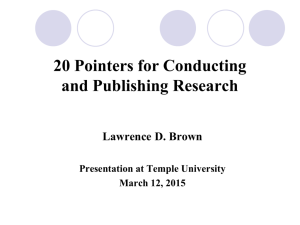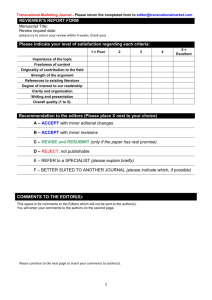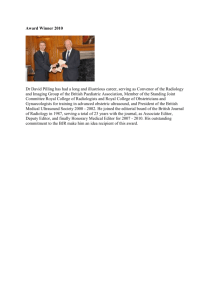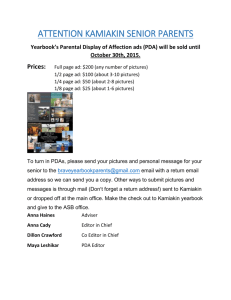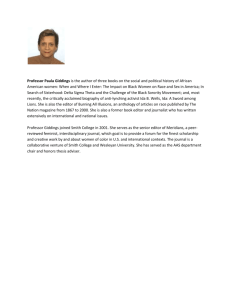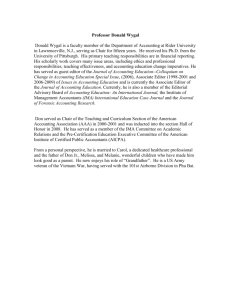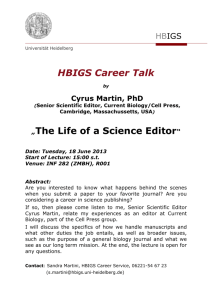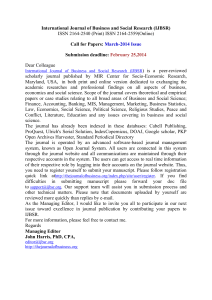Publishing Journal Articles: What we can Learn from an Editor's
advertisement
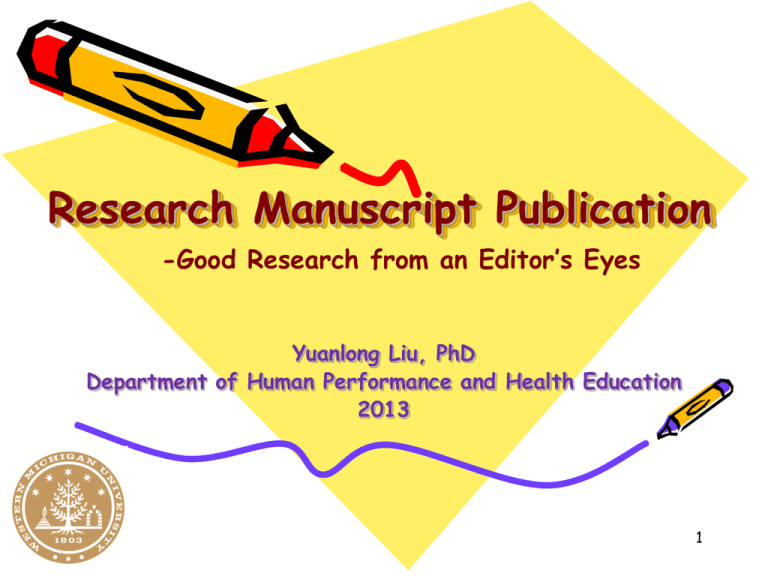
Research Manuscript Publication -Good Research from an Editor’s Eyes Yuanlong Liu, PhD Department of Human Performance and Health Education 2013 1 Why talk about research submission…? What is a good submission? Why look at from an editor’s eyes? Why me…..? 2 Who am I? What is an Editor’s Job? What Does an Editor see? 85% papers are killed! What is the Problem? Quality!!! I have a Dream… 4 It is HARD! • Teaching Carpenter • Service • Research Tenure and Promotion Tenure Clock Runs Faster You Should Know Where You Are Going from the Very Beginning Questions to Ask Yourself • • • • • • • • • Is my research program focused? How frequently am I publishing papers? In which journals am I publishing? Are these important journals (why)? Am I meeting departmental expectations for independent work, collaboration, authorship? Am I publishing from data collected here? Have I gotten (or tried to get) external grant support? How am I fitting into departmental and interdisciplinary research groups? Do I participate in departmental/interdisciplinary research activities (e.g., journal and discussion groups)? Based on Thomas. (2006). A Stylus Briefing. Overview of an Editor’s “Eyes” • An Attractive Title • Good Literature Review • Good Answers for the Four W Questions • In general, the editor is looking for Beautiful ART (a good story)!! 8 Give an Attractive Title -Good Title from an Editor’s Eyes 9 Shortest Title Science, 1988, 24:1130 Longest Title Be interesting …. Grab their attention 45 Words Science, 1988, 24:1130 Give an Attractive Title -Good Title from Editor’s Eyes Formal and informal clothing in different occasions in US - From a girl’s eyes! Assessing the best track and field performances -Is sky the limit? 12 Good Literature Review? Tips: Show gaps in the research Justify your own research (how good) Demonstrate your Understanding of your field (art) Summaries and evaluate past research Show similarities and differences Give an overview of controversies (Did you include the editor and reviewers’ research?) 13 Four W Questions • • • • What was the problem How did you study the problem What did you find What do these findings mean A Good Story!! 14 Reviewers – The Luck of the Draw Longest Editorial Delay 26 Years, 5 months Be patient Received by Bulletin of the JSME (Japanese Journal): April, 1960 Published: September, 1986 Science, 1988, 24:1130 Always take something good and learn from a review Hearing from the Editor • You will be upset (highly likely) • Read the reviews • and put them away – Come back to read them again when your heart rate is around 71/min • What can you learn and do? • Return revision in a timely manner Your worst fear or nightmare Editor-in-Chief Handling Reviewers • “This is the WORST paper I have EVER read.” – Many times Positive Attitude! • “This is the BEST paper I have reviewed for this journal.” – Jack Pot • Questions in your mind: – Who are these stupid reviewers? – Do they really know the content and/or methods? • Relax – You’ll be a reviewer too! – Unpaid volunteers – “Treat others as you would have them treat you” PEANUTS “Sometimes” you get rejected Handling Rejection • It happens to everyone • Should you contact the Editor? • Look & learn • There are other outlets If NOT You CAN handle rejection Revising and Resubmitting • Be timely • • • • • • • – Know when it is due – Know to whom it is to go “Thank you very much” Point-by-point response Clarify Don’t be afraid to disagree Be patient Be persistent Be realistic Scientific Misconduct • • • • Plagiarism Fabrication and falsification Non-publication of data Faulty data collection procedures • Poor data storage and retention • Misleading authorship • Sneaky publication practices Scientific Misconduct Examples • Co-authorship – How many? • Dual Publication • Professional embarrassment – fake data? • “It was the student who did it!” • Your name in the paper!! • “Publish my papers QUICKLY, please” Some Student/Novice Thoughts • • • • • Attention to detail Choose an appropriate journal Follow guidelines Format carefully Determine author order a priori Good Writing Strong writing can not compensate for bad ideas…. Writing takes practice. But weak writing can easily ruin good ideas. You should . . . . • be aware of what the Journal wants • be aware of who the Editor is • not be hesitant to call (or e-mail) • be complete • be patient More suggestions • • • • Neatness DOES count Line numbers Formatting Co-authors – Reviewers – Keep them informed Bibliographic Reference Software MS Word 2007 When it’s ready…. send it in. Working Together!! • • • • • Common interests Personality Work ethic/habits Your expectations Colleague/Advisor’s expectations • Changing your Mentor/Advisor Kay Williamson RQES paper - 1993 My Friendly Secret Suggestion Work Hard Confidence Find a Model Collaboration Thank you for listening! Have a Great Bronco Year! Questions? 45

